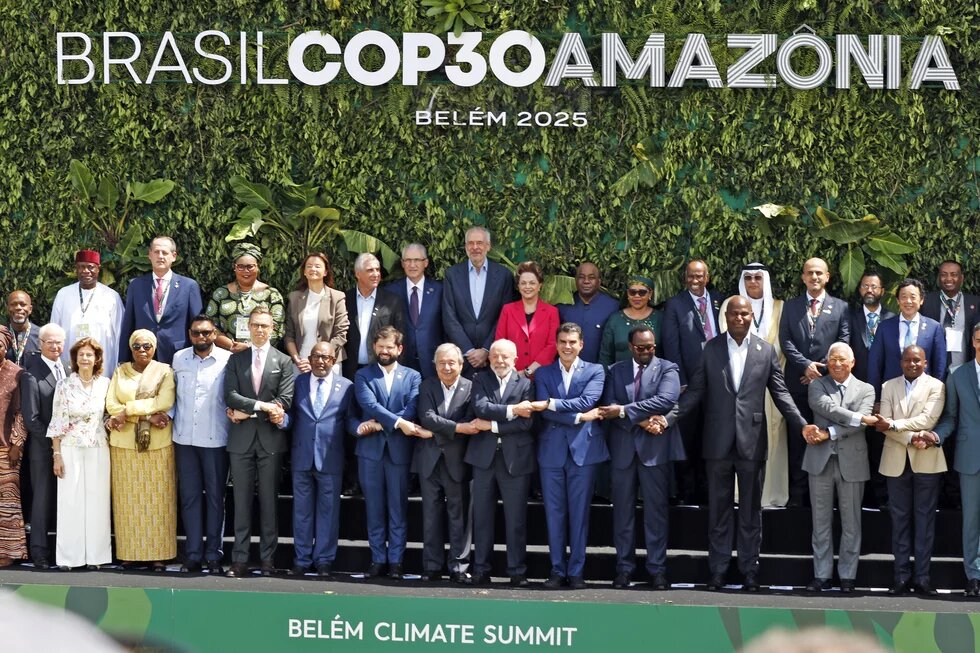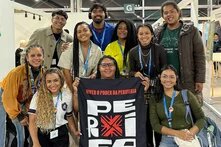Between 10 and 21 November, Belém will host the 30th Conference of the Parties (COP30) on Climate Change. This is an annual event organised by the UN and, for the first time, held in the Brazilian Amazon, a diverse region rich in resources but threatened by conflicts. If you would like to learn more about this region, check out our Atlas of the Brazilian Amazon!

Rethinking our relationship with nature is essential, and the Foundation will be following the negotiations and civil society dialogues to support and contribute to the discussions, amplifying the voices of the territories and highlighting experiences and paths to a positive future.
And for those who will not be in Belém to follow the negotiations in person, we will be sharing information here over the coming weeks so that we can keep track of developments.
Official negotiations and their topics:
During the negotiations, representatives from more than 160 countries will meet to discuss various topics related to climate change. Some will have crucial debates and potential agreements that could bring progress or setbacks. We share some of them here:
- Climate finance
The issue of climate finance is at a critical juncture in 2025. A key factor in this is one of the most important principles in the climate debate: the "common but differentiated responsibilities," which recognises the role of developed countries, given their historical responsibility for greenhouse gas emissions, in leading financial support for developing countries. To combat climate change, it is important that developing countries have adequate and sufficient resources mobilised, without generating further debt.
The New Collective and Quantified Goal (NCQG) for climate finance, agreed at COP29, is disappointing. It calls on developed countries to "take the lead" in mobilising "at least" US$ 300 billion per year by 2035.
In response, a report was produced, outlining a "BAKU TO BELÉM ROADMAP" of US$ 1.3 TRILLION from all sources — an amount closer to the estimates of the total international financing that developing countries need to achieve their climate goals. This report is expected to be discussed during COP.
Part of civil society is following this debate very closely (in 2025, the Foundation launched a series of explanatory texts and an infographic on climate finance) and, in addition to demanding a larger amount that is more appropriate to the needs of developing countries, they are also seeking to understand how this amount will reach countries and under what conditions.
Also on this topic, the Brazilian government, along with other tropical forest countries, will launch the Tropical Forests Forever Fund (TFFF). To learn more about climate finance and the TFFF, access our publications and those of our partners here: (COLOCAR O LINK PARA OS TEXTOS DO TFFF)
- NDC – NATIONALLY DETERMINED CONTRIBUTION
NDCs are voluntary targets that each country commits to in order to reduce greenhouse gas emissions and tackle climate change. The NDCs signed in the Paris Agreement have review periods every five years and, to date, 74 countries have submitted their adjusted targets, just over one-third of those that are part of the agreement. This is still a small number, which may complicate countries' commitments to reducing greenhouse gases, especially at a time when the US is leaving the UNFCCC.
It is important to mention and recognise the role of NDCs, which establish the baselines and cuts that must be made in each sector to limit global warming to less than 1.5°C, the main goal of the agreement signed in 2015. It is an instrument that has been recognised as having brought important results. Without it, there would not be so many countries concerned with reducing their GHG emissions. However, the small number of revised NDCs submitted reflects a concern for the future.
- Adaptation
One of the main debates at COP, and one that has attracted a lot of attention from civil society, is the issue of adaptation. As the COP30 Presidency rightly said in its eighth letter, "Without adaptation, climate change becomes a multiplier of poverty." With extreme weather events becoming more frequent and 1.1 billion people living in acute multidimensional poverty, discussing and promoting actions that reduce vulnerabilities and respond to the effects of climate change becomes a priority.
Based on a global goal on adaptation (GGA) established in the Paris Agreement, countries began discussing a list of indicators at COP28 that could measure progress towards the goal. The proposal for Belém is to reach agreement on 100 GGA indicators.
- Just Transition
Negotiations are also advancing on the issue of just transition, with no resolution at COP29 in 2024. Discussions are taking place with a view to implementing the Just Transition Work Programme (JTWP), created in 2028. However, there is still a lack of clarity about what a “just transition” means for countries. Most developing countries seek a more holistic vision, looking at social and economic transformation based on a transition in the energy matrix that moves away from fossil fuels and promotes climate justice. Meanwhile, developed countries are more focused on the energy transition alone and its impacts on labour and social rights, without entering into the debate on leaving fossil fuels behind. This is a sensitive issue in the negotiations and much discussion is expected.
Want to know more about the topic? Access the Cipó Platform document.
- New issues (and old ones) and their relationship to climate change
Climate change impacts various sectors, but it is the consequence of a production and consumption model that increasingly demands our planet's scarce resources—whether in terms of land use change, food production or infrastructure for new technologies. One issue, for example, is how the demand for artificial intelligence leads to the construction of more data centres and infrastructure, which impact territories by encroaching on protected areas and indigenous lands, and absorbing essential resources such as land and water. Or how aerial spraying of pesticides has been sold as a smarter tool in agricultural production, but with enormous potential for dire impacts on the environment, food, groundwater and the population living in these territories.
All these topics will be discussed in various areas throughout the conference. The Foundation will be monitoring and organising some activities to put a spotlight on those who study or work on these issues in the field. Keep an eye out!
- Challenges for the Brazilian presidency
There are high expectations as to whether the Brazilian government will be able to build significant consensus in the COP negotiation process.
Ongoing political and military conflicts have weakened multilateralism, creating a very complex context for countries. The Brazilian government has established participatory processes, such as the Mutirões, special envoys and leadership circles (which bring together experts and political leaders from different sectors and groups). The objective was to contribute to leveraging solutions capable of unlocking the negotiations. An unfavourable outcome in the negotiations could lead to frustration and have negative repercussions both on the multilateral process at the international level and on the government's visibility at the national level, given the growing questions about the discrepancies between some approved policies and bills (such as the law on deforestation and oil exploration in the Amazon estuary) and the government's international stance of leading the process internationally.
Civil Society and the People's Summit
In parallel with the official negotiation process, civil society movements and organisations will be organising the People's Summit between 12 and 16 November, autonomously and sovereignly, to denounce false solutions and propose alternatives and paths forward. It will be a space for dialogue, with thousands of people, voices from the territories, from those who protect the forest, from the countryside and the city.
There will be many exchanges, and it will all be well worth following. We will share information and you can also follow the Summit on social media and on their website: https://cupuladospovoscop30.org/en/ !
In addition to the People's Summit, there will be other initiatives for dialogue and monitoring of the negotiations. From independent media coverage, we highlight Amazônia Real, Casa Ninja Amazônica, the Mining Observatory, the Alma Preta agency, and Casa do Jornalismo Socioambiental, partners of the Foundation who will cover the negotiations from different perspectives. In addition, the NGO House and Science and Voices of the Amazon promise to be spaces for dialogue to discuss important issues on the climate agenda from the perspective of civil society.
Through our partners and allies, we will share as much information as possible so that you can stay up to date with the negotiations. We will also recommend several independent organisations and media agencies so that you can get even more details about this event.



